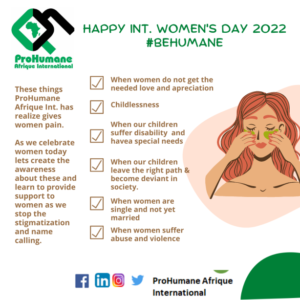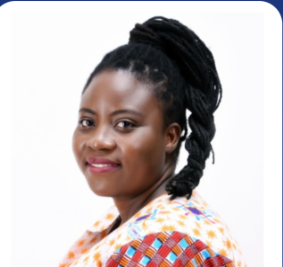“I am not free while any woman is unfree, even when her shackles are very different from my own.” – unknown
International Women’s Day is a global day celebrating the social, economic, cultural and political achievements of women. The day also marks a call to action for accelerating gender parity. Significant activity is witnessed worldwide as groups come together to celebrate women’s achievements or rally for women’s equality.
Marked annually on March 8th, International Women’s Day (IWD) is one of the most important days of the year to celebrate women’s achievements, raise awareness about women’s equality, lobby for accelerated gender parity and fundraise for female focused projects and charities.

This is why prioritizing projects that focus on improving the health, education, well-being, and economic security of girls across the globe must be supported. The United Nations began celebrating International Women’s Day in 1975, which had been proclaimed the International Women’s Year. In 1977, the United Nations General Assembly invited member states to proclaim March 8 as an official UN holiday for women’s rights and world peace.
Women deserve to be celebrated for their amazing contribution to society, extraordinary achievements and matchless courage as women continue to thrive to beat the odds. These are some of the best things to know about women in order not to cause them pain as all women need strength to empower, motivate and inspire each other to keep up the good fight. There are things that make women cry. As I create awareness about these, be an ambassador your own way to support changing the negative narrative. Before, some women were seen to supporting the ‘pull her down’ syndrome. Thanks, some level of success is chalked on this front to changing this negative narrative to a positive one. Be a 21st century positive minded-women who will support the call to lift at least one other women up each year then rather pulling her down.
The theme for the 2022 International Women’s Day (IWD 2022) is, “Gender equality today for a sustainable tomorrow” recognizing the contribution of women and girls around the world, who are leading the change on climate change adaptation, mitigation, and response among many others, to build a more sustainable future for all as well as achieving an equal future. Careers we believe must have no gender, so is leadership. To achieve gender equality today for a sustainable tomorrow we need to work towards an equal future where all stakeholders are aware, understand and invest in women and girls.
These things cause women pain.
When we do not show love and appreciation to women for all the efforts made generally in all things, it gives women pain. Appreciate women the little way you can to keep them going.
Childlessness gives women pain and this is the state of not having children. Childlessness may have personal, social or political significance. Childlessness may be by choice or circumstance.
In the African culture, the true meaning of marriage is only fulfilled if the couple conceives and bears children put forward by Dyer SJ et al in their study on “You are a man because you have children…” Human Reproduction 19(4): 960–967.
Africans consider their child to be a source of power and pride, and children act as insurance for their parents in old age. The most important aspect of bearing children is an assurance of family continuity.
Anthropological and sociological studies bear testimony to the considerable suffering associated with involuntary childlessness due to negative psychosocial consequences such as marital instability, abuse and stigmatization.
A study conducted on women by Gerrity DA (2001) on the biopsychosocial theory of infertility published in the Family Journal seeking infertility treatment in Southern Ghana revealed that infertile women used their internal coping strategies by keeping their fertility problem to themselves as a result of the stigma associated with it whilst others coped by drawing on their Christian faith. This Donkor ES, Sandall J (2009) confirmed in coping strategies of women seeking infertility treatment in Southern Ghana available in the African Journal of Reproductive Health 13(4): 81–93.
A study on Reproductive health found out that, Infertility or childlessness is a global reproductive issue for both sexes yet often neglected and not discussed in public. It is generally believed that more than 70 million couples suffer from infertility worldwide. In Sub-Saharan Africa, the prevalence differs widely from 9% in the Gambia, 21.2% in northwestern Ethiopia, between 20 and 30% in Nigeria and 11.8% among women and 15.8% among men in Ghana.
There are varying opinions on the definition of infertility. The lack of consensus on the prevalence of infertility is a consequence of differing definitions of infertility, the varying periods of time over which it is studied, and a failure to differentiate analytically between voluntarily childlessness and involuntarily childlessness. However, the Ghana Demographic Health Survey reports that voluntary childlessness is not common in Ghana, and currently married women with no live births are likely to be those in relationships with fertility problems. Infertility has been defined as failure to conceive after one year of regular unprotected sexual intercourse in the absence of known reproductive pathology.
However, epidemiological studies have revealed that in a normal population of heterosexually active women who are not using birth control methods, 25% will become pregnant in the first month, 63% within 6 months, and 80% within one year. By the end of a second year, 85% to 90% will have conceived. Because some couples, who are not infertile, may not be able to conceive within the first year of unprotected sex, the World Health Organisation therefore recommends the epidemiological definition of infertility, which is the inability to conceive within two years of exposure to pregnancy.
Infertility may be primary or secondary. Primary infertility refers to infertility of women who have never conceived and secondary infertility refers to infertility of women who has conceived at least once before. The use of the ability of the female to conceive as a measure to differentiate between primary and secondary infertility is however problematic as it places couple infertility on the doorsteps of the female partners the study – Understanding the Social Meaning of Infertility and Childbearing: A Qualitative Study of the Perception of Childbearing and Childlessness in Northern Ghana found out.
In spite of the statistics, women still suffer the worst of the blame for infertility problems. Infertility is also a problem socially because we live in a society where womanhood and manhood are generally tied to motherhood and fatherhood respectively. Please support that woman who involuntarily has not decided not to give birth and who is suffering as a result of circumstances beyond her control. Don’t stigmatize her nor call her names. Support her.
By observation we can count a number of successful entrepreneurs, men of God and many others who are occupying big positions and suffering pain because a number of their children have become deviant in society; neglecting the right path. It is every mother’s joy to see her children grow on the right path. If that doesn’t happen as a result of combination of several factors beyond their control, please support your fellow women and don’t stigmatize her. Let’s stop the name calling.
In Africa where marriage is so much desired, if you see a female marriage material and of age -who is still not married, offer her support if you can so are single parents with children. Stop the name calling and stigmatization.
When women suffer abuse and violence, it causes them pain. Let’s stop the abuse, violence, and stigma as well as the name calling. Currently, I can identify so many pressing issues facing women, and that includes violence against women and girls, which is the broader subject matter. It can be broken down to embrace—child marriage issues, intimate partner violence against mostly women, sexual harassment, and rape issues, trafficking in persons, violations against displaced women and girls. There are also girls’ education and women’s rights violations. The gender pay gap is trending due to the Covid-19 pandemic. This is because men and women in the same employment performing equal work must receive equal pay unless any difference in pay can be justified; our non–adherence to equal work for equal pay creates the “gender pay gap”.
Non-universal access to the internet and digital illiteracy is equally pressing. Covid-19 has moved the world online. The virtual space is booming and is the newest cash cow. Most people especially women and girls do not know how to access this virtual space and are not digitally literate to take the opportunity of this new normal. Access to the internet becomes another obstacle that needs to be addressed. Poverty and stigma, under-representation of women in decision-making and in hems of affairs appear the most pressing issues to me now.
“If you want something said, ask a man; if you want something done, ask a woman” as put forward by Margaret Thatcher. Women, lets change the narrative by getting this done. Let’s stop causing pain to ourselves. Sisters, aunties, mothers, mothers-in-law, grandmas, friends and all men it’s our call. I encourage women to step up. Let’s not wait to be asked by anyone.
Join me together to also pledge to stop causing pain to other fellow women.
Baptista is a Hybrid Professional and the Executive Director of ProHumane Afrique International. ProHumane is a charitable, development & think thank organization working with communities & individuals to create sustainable solutions to transform communities through diverse pro-poor initiatives.
Pro-poor initiatives are initiatives that help to alleviate poverty. Baptista is a realist, affable, simple and humane. You can reach her via e-mail on [email protected] and follow this conversation on all our social media sites: Linked-In/ Twitter/ Facebook/ Instagram: ProHumane Afrique International. Call or WhatsApp: +233(0)262213313. Hashtag: #behumane #thegivingcapsules #prohumaneafriqueint #fowc










